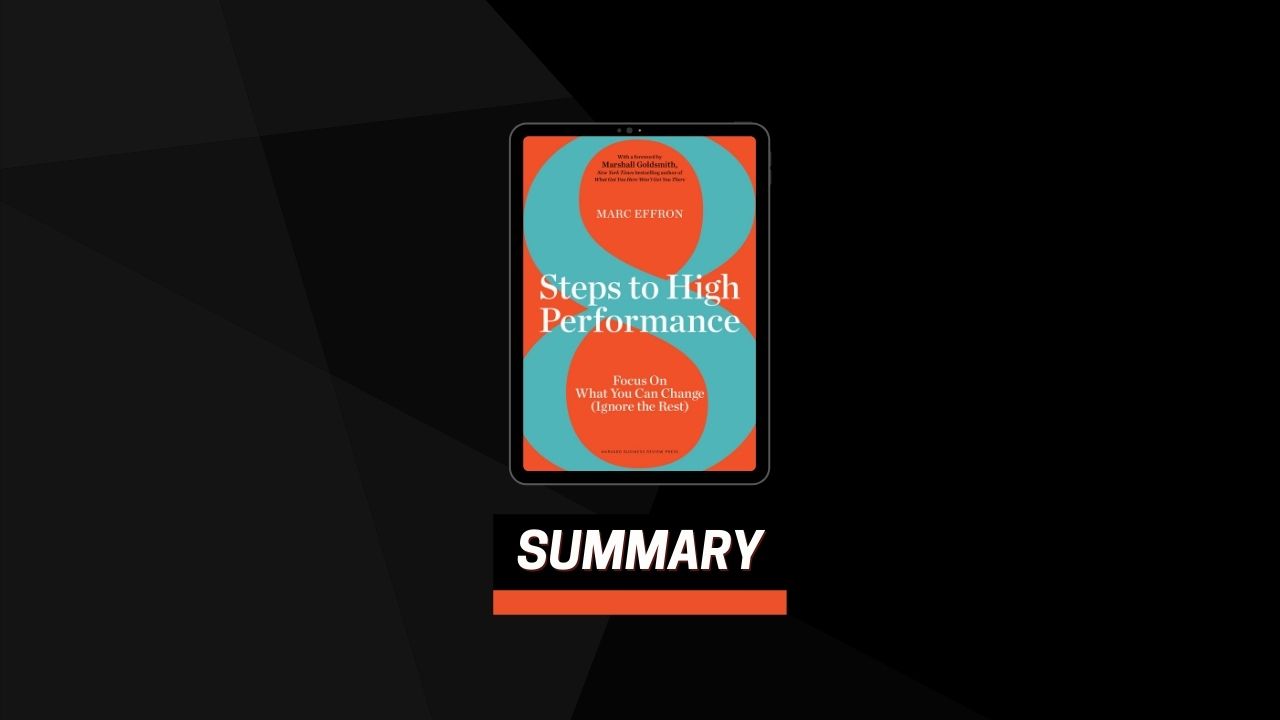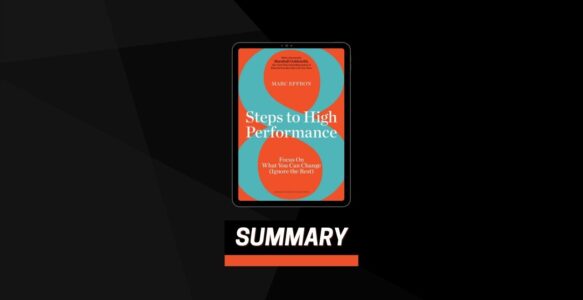What do you control that’s scientifically proven to improve your performance? The conclusive science suggests eight steps that will help you be a high performer.
The eight steps are straightforward but not easy. They require that you have the interest, commitment, and passion to be a high performer at work.
Step 1: Set Big Goals
High performance starts with great delivery driven by big goals and transparent coaching. Big goals create focus and motivation. Coaching ensures you’re on the shortest path to success. Big goals and coaching are also a great place to recognize that you need to take personal accountability to do both things well. Your manager may not be expert at those activities, but that shouldn’t hold you back from being a high performer.
you have the right goals in place and a plan for coaching, you’re on the path to higher performance. It’s time to take step two and build the behaviors that differentiate great performers from merely good ones.
Step 2: Behave to Perform
Understanding and displaying the behaviors that drive high performance may seem challenging. After all, there are hundreds of possible behaviors that your direct reports, peers, and boss might want you to show. Relax. There are only three things that you need to do: Understand how you’re naturally wired to behave and how people see you behave today. Identify which few behaviors are most important for your success at work. Develop an action plan to adapt quickly to those behaviors.
Your completion of steps one and two means that you can now deliver big results, while displaying high-performer behaviors. That’s the core of high performance, but it doesn’t guarantee success. You must continue to grow these capabilities to compete with those who want to outperform you. Step three, “grow yourself faster,” tells you how.
Step 3: Grow Yourself Faster
You become a high performer with great results and the right behaviors. You remain a high performer by continually growing your capabilities and skills to position yourself for bigger, more challenging, and more career-building experiences. The surest way to grow yourself faster is to successfully complete as many of the right functional and management experiences as you can, as quickly as you can. Learn how to identify experiences from the best in the field and then own how you progress through them. You will always be your own best career advocate.
You now have strong results, great behaviors, and a plan to continuously improve. Step four, “connect,” will show you how to build the strong internal and external networks that enable and sustain your success.
Step 4: Connect
Connecting can be one of the most challenging elements of becoming a high performer because you can’t directly control its success, there are social conventions you must follow, and some people are naturally more comfortable with it than others. The great news is that your network will multiply your success. A strong network will bring you the contacts, insights, and resources that will help you be a high performer. The science is clear that building great relationships, even by ingratiating yourself with others, will advance your career.
There are a few more actions you should consider to extract the most power from steps one through four. When you understand how your company’s needs will change, you can adapt your behaviors and mindset to keep your performance high in nearly every business challenge. Step five, “maximize your fit,” gives you the tips and tools to do exactly that.
Step 5: Maximize Your Fit
Fit is a powerful factor in your quest for great delivery and high performance. It’s the only one of the eight steps that relies on something that you can’t directly control. However, if you assess your fit and adapt your behaviors and capabilities to what your company demands, you’ll be able to sustainably perform at a level that few can match.
When you’re not a natural fit with your company, you must learn when and how to “fake” the behaviors your company needs. Step six, “fake it,” tells you how to do that and why faking it, at times, is far superior to being the genuine you.
Step 6: Fake It
Two performance factors you can’t fake are sleep and exercise. While there’s no shortage of internet wisdom on these topics, a high performer only cares about what’s scientifically proven to work. Step seven, “commit your body,” tells you what’s proven to help and what doesn’t matter.
Step 7: Commit Your Body
How you manage your body is a completely controllable factor, but one that primarily prevents decreased performance rather than boosting it. Some of the facts about sleep and exercise may be familiar to you, but high performers need to be more strategic in how they apply them. Your great performance, investment in your personal growth, and stellar behaviors can all be undercut if your sleep strategy fails. Fortunately, the science doesn’t say that high performance requires Olympian levels of exercise or teenage-quality sleep. Six or seven hours of sleep in a cool, quiet room and some intense morning exercise should deliver the goods.
You now know the seven steps that create a direct, controllable path to high performance. There’s just one more thing to do—don’t mess it up by falling for a performance-sapping management fad. Those fads come from both well-intended and less-well-intended sources, but they share the common denominator of hurting your ability to be a high performer. In step eight, “avoid distractions,” you’ll learn which of the most popular fads you should ignore.
Step 8: Avoid Distractions
A high performer should carefully evaluate any concept that’s marketed as a quick and easy way to improve performance. Use the “research, science, or conclusive science” screen before you believe any claims, because those that sound too good to be true typically are.
Please Don’t Focus On Your Strengths
Your strengths are your strengths because of your personality, career path, and interests—they’ll never stop being your strengths. If you turn up the dial higher and higher on them, you’ll create derailers. Keep listening to others about the skills and behaviors that you should improve to be more successful.
Emotional Intelligence Doesn’t Predict Leadership Success
It is helpful to understand how people see you manage your own and others’ emotions and to correct any harmful behaviors. Doing each of these things well enough to be successful isn’t a different type of intelligence than IQ. It’s just about behaving in a way that your peers and coworkers value.
Ten Thousand Hours of Practice Is Exhausting and Irrelevant
Recognize that natural talent plus lots of practice will produce great results. No natural talent plus lots of practice will produce a reasonable weekend backhand or jump shot.


